Claude Forthomme's Blog, page 45
June 6, 2013
Do You Really Want to Live 120 Years?

Is the dream of a long and happy life within reach? The National Geographic recently published an article about the progress of science in this area and optimistically slapped a baby face on its cover suggesting that your child might live to be 120 years old (see photo, that's the Italian edition I get here, if you want to read the full article in English, click here).
The facts.
How probable is all this? More probable than you think. We all know that life is getting longer, that the new "real old age" starts at 80 and not 60, and we've all heard of amazingly old villagers in Italy, in Calabria and Sardinia. Scientists here in Italy have engaged now for years in systematic research to try and uncover the "secret" of old age. Add to that other research in other parts of the world, in Switzerland, in Ecuador, in the United States, and you get an interesting, if complex, picture of where Science stands on this question.
To begin with, this new research is putting dents into some convictions like the one about the benefits to be derived from a restricted diet based on mainly fruits and vegetables. While centenarians from rural areas in Italy often ate that way, it's basically because they were poor and had nothing else to eat when they were young and continued to eat the same way out of habit even when their economic circumstances improved.
And that's one more reason why the question of longevity is treated in genetic terms.
First, it's a question of having the right genes to avoid early death from major life-threatening diseases like cancer. For example, there have surprising results from research among men suffering from a recessive mutation in a single gene that causes the so-called "Laron syndrome", a form of dwarfism that is prevalent in many families in El Oro province. It would appear that the "little people" as they are known locally, are (relatively) immune to cancer and diabetes. Such conclusions are based on serious epidemiological research that started in 1987 and has identified about 100 people suffering from Laron syndrome. Moreover the results are comforted by a set of complementary experiments carried out in the laboratory on mouses. In 1996 Andrzej Bartke, a scientist at Southern Illinois University, shut down the growth hormone pathway which resulted in
smaller mice but also, surprisingly, produced longer-living mice by a noticeable margin: some 40 percent longer than normal mice.
This suggests that there might be a link between genes that govern growth and cancer which is, as everyone knows, a condition where cells are multiplying in disorder, as if growth had run amok.
Second, the question arises whether there is a gene responsible for longevity. In Italy, since 1994, scientists at the University of Calabria have carried out solid demographic surveys of families with centenarians to try and figure out how much of longevity is determined by genetics, how much by the environment and how these factors interact to contribute to longevity. The scope of this research has recently turned up an astonishing finding: contrary to accepted wisdom that women live longer than men, a 2011 paper reported that the genetic factors involved seemed to
benefit males more than females. While the genetic component of longevity appears to be stronger in males,
women may take better advantage of non-genetic factors such as diet and
medical care.
So women should not despair, with diet and medical care, the chances of enjoying a life as long as men can even out!
Clearly the question is far more complex than just having a gene that you engineer for longevity and you're done. Calabrian researchers have shown that there are at least five or six pathways that influence longevity, and they include response to stress, the
metabolism of nutrients and metabolism in general, i.e. the storage and use of
energy. Anything really can influence how long you live, from childhood diet to how long a person attends
school.
In America, research is going in another direction at the Albert Einstein College of Medicine, with studies of brain function and mobility in the elderly. Plus a particularly interesting study of 500 centenarians, all Ashkenazi Jews who were found to have exceptionally high levels of HDL (the good form of
cholesterol). This was apparently caused by a
variant of a gene known as CETP (cholesteryl ester transfer protein) which protects against cardiovascular disease.
You can easily imagine how this finding has sent off pharmaceutical companies on a frantic search for drugs that would replicate the action of the centenarian variant of CEPT!
The search for genes with key metabolic responsibility in the mitochondria of centenarians also goes on at a fast clip. Think of the mitochondria as the cell’s power
plants, with their own DNA and genes. Several mitochondrial proteins have been identified by Einstein College scientists, the so-called "mitochines" associated with people who live into their 90s and 100s. One molecule in particular, dubbed the "humanin" has been shown to have surprising effects in experiments on rats: it was found to normalize glucose levels and essentially erase
diabetic symptoms in a few hours. It also prevents arteriosclerosis and
Alzheimer’s in mice prone to these diseases and helps limit coronary
damage when attacks in the experimental
animals are induced.
In short, human genetics research is currently focused on seeking "protective genes". One of the most promising is called FOXO3 (I love the name!), which has been found in long-lived Japanese-American men on the island of Oahu. This
gene is similar to the one identified in the Laron population in southern
Ecuador. Other scientists, at Einstein, are studying stem cells, suspecting that there might be influences on the fetus that affect genetic mechanisms at the beginning of life
that somehow set the rate of aging.
Recently, scientists in Switwerland have treated worms with antibiotics and expanded their life span by 60 percent (see article below).
So are we close to identifying a sure path to longevity? Not really, not yet, but we're on our way, no doubt about it.
Question: Will living long make you happy?
It depends. Just imagine for a moment that science gives us the option - I expect this could happen in about 80 years or so - to choose, assuming you have the means, to join an Age Prevention Program that will guarantee youthful looks till the day you drop dead. Because die you must: it seems we are genetically programmed to last some 130-140 years and not more.
So you look young and you feel good all your life. Is that a blessing or a curse?
Two years ago, I asked myself that question and came up with an answer in fictional form, a short-short story, flash fiction really, to try and move you and make you think. Curious? Here it is, on Read Wave, a cool new site for readers:
Read on ReadWave.com
This is the original story which was the starting point of the serial level I am currently writing, 2213:Forever Young. Part One and Part Two of Forever Young are just published, I'm currently working on Part Three and it will be soon available.
Do let me know in the comments: do you believe longevity is pure gold, particularly if the problems of aging have been solved, or is there something not quite right about it?
Related articles
 SCIENCE: Will Your Child Live To Be 120 Years Old?(davidmixner.com)
SCIENCE: Will Your Child Live To Be 120 Years Old?(davidmixner.com) Ecuadorean Villagers May Hold Secret to Longevity(thehandiestone.typepad.com)
Ecuadorean Villagers May Hold Secret to Longevity(thehandiestone.typepad.com) America's Oldest and Healthiest Reveal Their Secrets to Living Vibrantly to 100 and Beyond In New Book by Gwen Weiss-Numeroff(prweb.com)
America's Oldest and Healthiest Reveal Their Secrets to Living Vibrantly to 100 and Beyond In New Book by Gwen Weiss-Numeroff(prweb.com) How long will you live?(macleans.ca)
How long will you live?(macleans.ca) Live Long!(ihaveknowledge.wordpress.com)
Live Long!(ihaveknowledge.wordpress.com) Slowing the aging process -- only with antibiotics(eurekalert.org)
Slowing the aging process -- only with antibiotics(eurekalert.org) Single Gene Leads to Longer Lifespan Across Species(blogs.discovermagazine.com)
Single Gene Leads to Longer Lifespan Across Species(blogs.discovermagazine.com) Skepticism on the Near Future of Rejuvenation Biotechnology(fightaging.org)
Skepticism on the Near Future of Rejuvenation Biotechnology(fightaging.org)









Published on June 06, 2013 10:43
June 3, 2013
Book Reviews: Why They No Longer Help in Book Discovery and How to Improve the Search for Good Reads
 Book reviews are the key to book discovery. That's conventional wisdom. And it's rooted in what the publishing industry has been doing since Dicken's time to leverage the effectiveness of book reviews: major literary critics and authors are asked to write book reviews that are then published in major papers with a wide circulation or literary journals with a targeted audience.
Book reviews are the key to book discovery. That's conventional wisdom. And it's rooted in what the publishing industry has been doing since Dicken's time to leverage the effectiveness of book reviews: major literary critics and authors are asked to write book reviews that are then published in major papers with a wide circulation or literary journals with a targeted audience.With the digital revolution and the rise of the e-book, all that is changing. Traditional publishers are losing ground to what is happening on line where book reviews are "diluted" across a myriad of e-platforms, from the biggies like Amazon's Kindle Store where customers are encouraged to write reviews to thousands of small book review blogs. New websites are springing up every day, from Read Wave to Wattpad. The latest is BookLikes that claims to be like a "new Tumblr" for authors.
Now that wouldn't matter much if the market share of e-books was small or declining - but it is large and rising, and therefore how book reviews are handled on the Net is becoming increasingly important. Consider the size of the problem: by 2012, according to a new Bowker research, e-books had clearly "come of age" with a market share of 44% of book purchases by volume in the US and 38% in the UK.
Add to this the fact that the digital revolution has brought on a tsunami of new titles. For example, the Kindle Store has some two million titles with over 1,000 added each day.
How can a poor reader find his/her way in this tsunami of e-books and online reviews?
The short answer: he/she cannot. Traditional reference systems (like the New York Times or Granta) are over-run, indeed Granta is in crisis. Publishing Trends reported that waves of spammers were hitting e-book stores (see here), among them a clever guy going by the invented name of "Manuel Ortiz Braschi" who published over 3,000 books on the Kindle Store,
including public-domain titles like Alice in Wonderland.
Mike Essex, a Search Specialist at UK digital marketing agency Koozai tested the system by publishing a song lyric and repeating it over and over throughout an e-book without Amazon detecting it. As he wrote in his blog: "It’s maddening. The logic of ‘the market will decide’ is flawed. How
many customers have to be ripped off by shoddy content that adds no
value before someone leaves a bad review? There’s no option to report a
book as spam, and people can get away with rubbish content which dilutes
the offering for good authors."
That was two years ago, back in March 2011.
Has anything changed? Yes, I double-checked. Manuel Ortiz Braschi no longer exists on Amazon and where appropriate, titles he had taken over were given back to their rightful authors (like Reverend Andrew Murray's Absolute Surrender).
Also there is a simple option to report a book spam: just contact Amazon.
So does this mean that Amazon-style online customer reviews "work" as quality control of the market?
Not quite. There was the scandal around "sock-puppet reviews" that exploded last year when some writers were caught using family and friends and paying services for glowing reviews, not to mention the unsavory practice of writing reviews under a false name damning rival authors books. Best selling authors have admitted to using such services, notably R.J. Ellory, the British crime writer and John Locke, the self-published author who sold one million books on Kindle in five months (now we know how he did it, it wasn't some sophisticated marketing technique like "loyalty transfer" as he claimed...).
Is the scandal over? More or less. Although Amazon went a little too far and faced a backlash from authors when it quietly removed reviews from writers in the same genre (for examples, see here), it did move to police its review system and now it regularly catches authors even when they use different Amazon accounts.
Does this mean that all is well with the online review system? I've blogged before about how it could be improved through encouraging reviewers to link more closely the content of their reviews to the number of stars they award a book (see here). But this amounts to minor tweaking of the system.
What would probably cause a major boost to book discovery would be a change in the search system to "kick up reviews in full view".
As of now, there are three major systems to browse for books: click "fiction" and you can get a breakdown by Best Sellers, Hot New Releases and Editors' Pick - plus a line of recommendations based on "items you own" (that works if you log yourself in). Plus all sorts of other goodies: "New and Notable", "Father's Day/Mother's Day etc Gift in Fiction", "Best Selling Fiction in Featured Categories" (that includes poetry and short stories), "Sponsored Selections", "Featured Fiction Books Rated 4 Stars and Higher" and more.
What is evident is that the bestseller notion is worked to death: you have the current top 100 in titles that are paid for and those that go free, and those that stay the longest in the "top 100" category. As I write, Dan Brown's Inferno is number one, it's been up there for 103 days.
Pretty sophisticated! Yet, there are major drawbacks to the system.
First, "items I own" are not a good indication of what I'm looking for: I could feel I want something different (I often do and I bet you do too) and Amazon cannot know this - plus it recommends books that one already owns (the algorithm needs a little improvement there...).
Second, it's difficult to get out of the Top 100. It's not intuitive, you have to click many times to move away from bestseller lists. Then when you do, you find you can rank the titles by "new and popular" (meaning highest sales), by price (gives you no idea of the book's quality) and by publication date (who cares?) and also, oh surprise, by "average customer review". Alas, the meaning of that phrase is obscure but, upon verification of a few, I noticed that the top title, while it had fewer reviews than, say, the third-listed title, it did not have any one-star or two star-reviews like the other did - which suggests that this is a star-weighted system of ranking.
Three, Editors' Pick that includes things like the "the Best Books of the Month" and "Kindle Select 25: Exciting Books This Week", is a black box: who decides, who says what is best and exciting? Presumably the titles are picked by Amazon's own publishing imprints.
More generally, all those so-called "featured" and "sponsored" categories do not have any clear definition and Amazon does not provide one. For example, if you dig into the list of books "Rated 4 Stars and Higher", you'll find to your surprise (I was!) that there are only 6 titles in there and all of them except one not yet published. They are in fact reviewed in advance, presumably through Amazon's Vine Program.
In short, there are two major navigating systems available to readers looking for new reads in the Kindle Store (or any other e-book platform). One is sales rankings, the famous "top 100", and it remains the major one and most talked about: that's the one authors compete to enter in, that's the one reported in the press. The problem? Sales give you no intimation of how good these books are, they don't help in book discovery. If anything, since success breeds success, there is a tendency to always find the same authors in the top 100.
Is the other major search system proposed by Amazon, the one based on "average customer review" of help in book discovery? One problem, as mentioned above is that the criteria used to define the category is not clear. The second and bigger problem is that the top 100 slots are solidly occupied by books with reviews in the thousands - clearly titles that have been "popular" for quite a while and are selling accordingly. In a sense, while the books are not ranked in the same order as the top 100 in "paid in Kindle Store", the list is a duplicate and doesn't help in book discovery. It's not cool.
Plus this list has some serious anomalies: for example, Jodi Picoult's The Storyteller has over 1,700 reviews, yet it ranked #200 on the "average customer reviews" list but, surprise, it stood at #53 in Paid in Kindle Store. Why is it so far down the "reviews" list? Maybe because it has a very high number of bad reviews (31 one-star and 56 two-stars) or maybe not.
In short, this approach to book discovery is a dead-end.
What is needed is a search system that would identify high quality books in a "cool" top 100 list.
How to get there given the limitations of the present system? You could imagine a cut off point and only list books that made the cut. And of course rank them. But how would you define that cut-off point?
Could outside forces - say the members of Goodreads or other book reading clubs - be somehow drawn in to help set up this list?
Could Amazon use other parameters than book reviews?
Any ideas?
My sense is that Amazon's book reviews system doesn't catch new books as they are published. The Vine Program as I blogged before (see here) is an essential instrument but it could probably be upgraded and the best reviewers turned into some sort of vetting committee. I know self-publishers hate gatekeepers and that is what traditional publishers are most criticized for. But something needs to be done to ensure book discovery in the digital age: by itself, contrary to what is commonly believed, the cream will not rise to the top.
Related articles
 The problem of reviews...(fablesofgriffon.wordpress.com)
The problem of reviews...(fablesofgriffon.wordpress.com) Hack the Publishing Hackathon(go-to-hellman.blogspot.com)
Hack the Publishing Hackathon(go-to-hellman.blogspot.com) My Kindle reviews!(author-leanneherrera.blogspot.com)
My Kindle reviews!(author-leanneherrera.blogspot.com) The Business Rusch: Word of Mouth(kriswrites.com)
The Business Rusch: Word of Mouth(kriswrites.com) Using Word of Mouth to Grow Your Small Business(hiscoxusa.com)
Using Word of Mouth to Grow Your Small Business(hiscoxusa.com) BookLikes: Do We Need Another Book Discovery Site?(goodereader.com)
BookLikes: Do We Need Another Book Discovery Site?(goodereader.com) Review or Not To Review(dclozeau.wordpress.com)
Review or Not To Review(dclozeau.wordpress.com) Recommendation Power(twocandobooks.wordpress.com)
Recommendation Power(twocandobooks.wordpress.com)









Published on June 03, 2013 01:54
June 1, 2013
Solar Panels: Is There a Quality Problem?
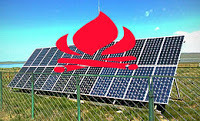
Solar energy seems like the perfect solution: cheap and boundless. You get all the energy you need for free - barring the initial investment for the installation - and added bonus, it's all done at no damage to the environment.
But there's a catch: quality could be a problem.
Worrying news of failure of solar panels are seeping out of the United States, I say "seeping out" because the news are still few and far between: see the articles below that I was able to pick off the Internet. A fire was reported at a highschool in St Louis (Mo) last month, and when this happens there is always someone else ready to advise how this could have been avoided.
The problem is that such events are happening more often as more solar panels are installed. How safe and how effective are solar panels?
No one knows.The furor around solar panels started three days ago in reaction to a New York Times investigation published on May 28 (to read it, click here). The NYT article highlighted a particularly grievous event in Los Angeles where a large rooftop installation guaranteed to last 25 years failed after only two years due to a defective outer coating while other defects caused a fire that took the panels off line for two years.
Why this "rash of defective panels"? It appears to have been caused by competitive pressure - especially from the low-cost Chinese solar panels - as American producers sought to cut costs by resorting to cheaper materials, compromising the longevity of their products.
That's free competition for you! In an unregulated market, the only way producers can defend themselves is by resorting to cost-cutting - at the expense of quality of course.
As the NYT reporter Todd Woody writes, "Worldwide, testing labs, developers, financiers and insurers are
reporting similar problems and say the $77 billion solar industry is
facing a quality crisis just as solar panels are on the verge of
widespread adoption."
No one is sure how widespread the problem really is, there are no reliable industry-wide figures about defective solar panels. And as pointed out in the NYT, "when defects are discovered, confidentiality agreements often keep
the manufacturer’s identity secret, making accountability in the
industry all the more difficult."
The solution? An overseeing independent institution to hold solar panel manufacturers accountable. Such an institution would deliver certificates guaranteeing the quality of the products. This is standard in many industries (especially food industries), why not solar panels?
Manufacturers might initially object and see that as curtailment of their freedom but in fact it would help them, weeding out the dishonest producers. Furthermore, certificates could provide a classification, giving a triple A to the highest quality and a C to the lowest, so that you would know as a consumer what you are getting.
Both the European Union and the United States have the appropriate institutions that could do this. What's required is a Food and Drug Administration approach to industry, in particular to regulate the quality of new technologies.
What is your opinion, any advice?
Related articles
 Defective panel epidemic threatens solar's resurgence(bizjournals.com)
Defective panel epidemic threatens solar's resurgence(bizjournals.com) Expert Stresses Solar Panel Safety After Webster Blaze(stlouis.cbslocal.com)
Expert Stresses Solar Panel Safety After Webster Blaze(stlouis.cbslocal.com) Eliminating Solar Panel Fires from Wire Faults(scottscontracting.wordpress.com)
Eliminating Solar Panel Fires from Wire Faults(scottscontracting.wordpress.com) Support Production of Quality Solar Panels(forcechange.com)
Support Production of Quality Solar Panels(forcechange.com) Solar Industry Anxious Over Defective Panels(parislemon.com)
Solar Industry Anxious Over Defective Panels(parislemon.com) Crappy solar panels threaten industry growth(grist.org)
Crappy solar panels threaten industry growth(grist.org)









Published on June 01, 2013 01:43
May 29, 2013
Why is Success in Writing so Elusive?

Popularity ranking or The Long Tail
Why is the writer's life so hard? Because readers tend to forget what they read? That's what a recent post by Ian Crouch in the New Yorker suggested: if true, then whatever passing success we might have with our books is destined to fade unless we can do something dramatic to remain in the "public consciousness" (is that possible for books? I wonder...)
Tobias Buckell, a New York Times best-selling author with a long experience of digital publishing, made a further suggestion: 90% of the advice about writing is bullshit right now he says, and he explained why on his blog (here). Very, very few books sell, he points out, most are nested in the so-called "long tail", i.e. forgotten, submerged in the Kindle's two million book titles. In one word: passed over, burned away. Only the top 100 titles on Amazon sell, the others don't. It's a vicious, self-feeding circle, the crown always comes to rest on the same heads in the green area.
He then applied to the world of books the concept of "survivorship bias" often used in finance but born during World War II from a question put by the US Air Force to a math genius (curious about that? See here, a long read but as Buckell says, most profitable). Mathematically speaking, much more can be learned from median and below-average data, in this case from the majority of writers (those who don't sell) rather than from the few who do. Survivorship bias means we are overlooking the lessons from failure, thus leading us to an overly optimistic view of digital self-publishing.
You should always pay attention to both sides of the equation, the winners and the losers. You should always ask yourself "what am I missing, is what I see all there is?"
To illustrate the point, Buckell refers to one of Mark Coker's most telling diagrams in his recent Smashwords marketing guide (a must-read, by the way):
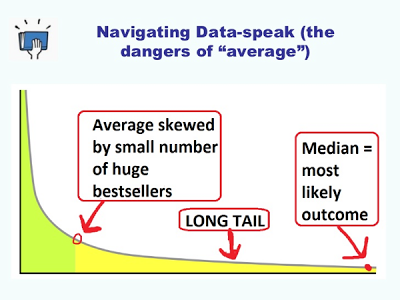
And this diagram, once populated with real data from real book sales made by Smashwords' clients (note: most writers who are digitally published use Smashwords) looks even worse, steeper - the green area is almost gone! - and with a super long, flat tail:
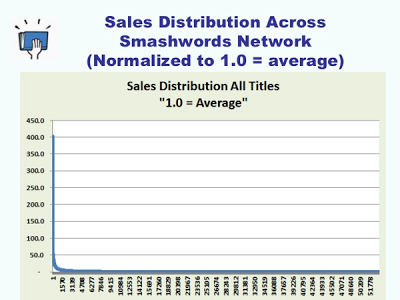
This is the lesson Buckell draws: "The problem, right now, in eBook direct sales, is that everyone is
paying and listening to people in the green area. They’re listening to
everything they say, and sifting everything they say as if it’s a
formula for success."
Sure, a "formula for success" that is a mirage and a lure. And people stuck in the long tail are not talking, they're not telling you why they're stuck there. As journalist David Mc Raney says on his fascinating blog exploring the concept of self delusion, "if you spend your life only learning from survivors, buying books about
successful people and poring over the history of companies that shook
the planet, your knowledge of the world will be strongly biased and
enormously incomplete."
So what can we learn from failure? Put another way, for us poor writers, how do you get out of the long tail?
Buckell's advice is simple: pay attention to those charts and act accordingly. He says he's "thrilled" with where he is, and that is certainly far ahead of many: "over half my income", he explains "comes from writing
fiction (and if I weren’t in debt from having a medical crisis in 2008
I’d likely be able to make a living just on my fiction). I’ve been
slowly building my career since 1999, since my first tiny sale. Each
year my readership grows, my blog audience grows, the money I make off
my fiction grows. I use eBooks, traditional publishing and crowdsourcing
all as tools to survive. I’m playing the long game."
More precisely, what I walk away from what he says is this. Being a "hybrid" author, Buckell uses all the different means available to an author today:
- big publishers
- digital self-publishing
- crowdsourcing (great to get funds to finance your marketing expenditures)
- sales off his website (yes, it's cool and clean-looking)
And as he says (in the conversation listed below) he's open to "some interesting other companies that are popping up" without telling us which ones...
Indeed, what one should do is play the "long game", there's not one "true new way to success" but many...Writers have created now, through digital publishing, a direct-to-reader marketplace: up to them to use it in the best possible way! That means keeping at it in every way possible, using all known marketing techniques and above all keep writing, writing, writing...And remember, to break through, ultimately you need luck and luck comes to those with an open mind, who keep smiling and trying everything that comes their way.
Think positive!
Any advice you'd like to add based on your experience?
Related articles
 A Conversation With Author Tobias Buckell About Self-Publishing Hype(teleread.com)
A Conversation With Author Tobias Buckell About Self-Publishing Hype(teleread.com) Being a Good Writer: Tips From the Pros(english.answers.com)
Being a Good Writer: Tips From the Pros(english.answers.com) How to Craft a Bestseller: David Farland's Not So Secret Recipe(claudenougat.blogspot.com)
How to Craft a Bestseller: David Farland's Not So Secret Recipe(claudenougat.blogspot.com) The Misconception: You should study the successful if you wish to become successful.(cazmeister.wordpress.com)
The Misconception: You should study the successful if you wish to become successful.(cazmeister.wordpress.com) New Report from Mark Coker an Eye Opener for Book Sales Strategies!(authorshelpingauthors.wordpress.com)
New Report from Mark Coker an Eye Opener for Book Sales Strategies!(authorshelpingauthors.wordpress.com) Survivorship bias and electronic publishing: practically no one is making any money(boingboing.net)
Survivorship bias and electronic publishing: practically no one is making any money(boingboing.net)









Published on May 29, 2013 11:12
May 26, 2013
One of Rome's Best Kept Secrets: the Municipal Rose Garden
 Among the myriad tourist attractions in Rome, the Municipal Rose Garden is easy to forget yet in May it reaches unparalleled splendor. Established in 1950, an international rose competition has been organized here every year (now at its 71st session) and new, extraordinary roses compete for the attention of connoisseurs. Winners are left in place and populate what is probably a unique rose garden in Europe, sitting in an area that has been a Jewish cemetery for 250 years (it was expropriated by the Governorship of Rome in 1934). Part of the city agreement with the Jewish community was to set up at the entrance a couple of stelae as a reminder (see photo).
Among the myriad tourist attractions in Rome, the Municipal Rose Garden is easy to forget yet in May it reaches unparalleled splendor. Established in 1950, an international rose competition has been organized here every year (now at its 71st session) and new, extraordinary roses compete for the attention of connoisseurs. Winners are left in place and populate what is probably a unique rose garden in Europe, sitting in an area that has been a Jewish cemetery for 250 years (it was expropriated by the Governorship of Rome in 1934). Part of the city agreement with the Jewish community was to set up at the entrance a couple of stelae as a reminder (see photo).And here's an American rose that won the competition back in 1971. Appropriately called Super Star Climbing Rose, it's exceedingly tall:
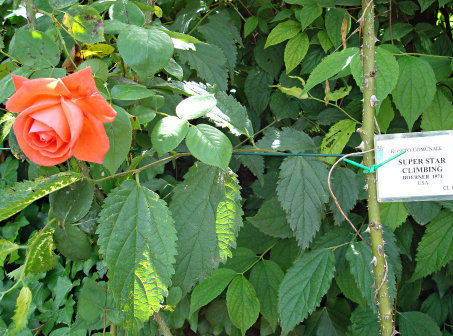
Foreigners who live in Rome know and blog about it (see below) but I wanted to share with you what I found out.
First the layout. There is a lower garden, coasting the Circo Massimo (Circus Maximus where the chariot races were held) and the ancient ruins of Cesar's palace that overlook it:
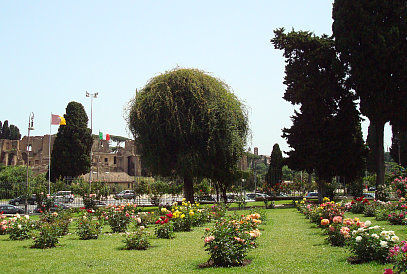
And, separated by a road now closed to traffic, there's an upper garden climbing towards the Aventino hill:
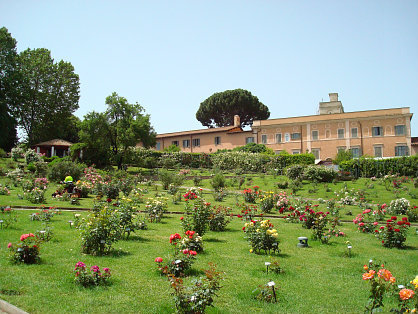
Here is where you find the classified roses with name and provenance - there's a predominance of French, Dutch and Danish roses, plus a few from far flung countries, as far as New Zealand. And there are posters explaining the history of roses. Did you know that the oldest fossilized rose predates man, it is 40 million years old and was found in Oregon?
The varieties are so numerous you get lost. Here's a bizarre purple one:
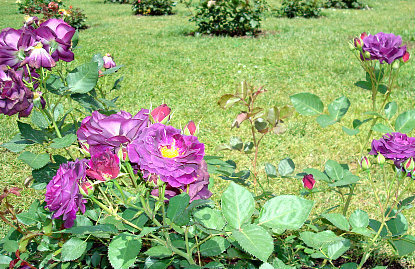
And here's a classic yellow one:
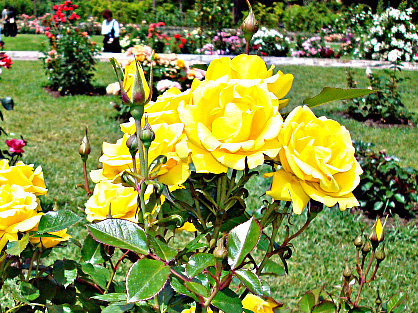
And a splendid pink one, just about to fade away with some hidden insect in its heart, I have a very Bruegel-like love for insects crawling among flowers - also the last stage of bloom, just before collapse is so touching...:

Roses were important from the start of human history as numerous posters scattered in the garden remind you (in both Italian and English). Here's one that introduces you to the section where the more ancient roses are kept:
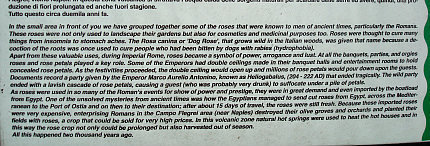
It may be hard to read for you, here is what it says: in ancient Rome, roses had a cosmetic and medicinal value, they cured anything from insomnia to dog bites (hence the name rosa canina, the Dog Rose). And they were much sought after by rich Romans to grace their banquets and show off their wealth, for cut roses were imported from Egypt at great cost - no one knows today how they stayed fresh after a 15-day trip across the Mediterranean, that secret is lost. Apparently the custom was to store thousands of rose petals inside double ceilings above the guests and half-way through the meal, the ceilings were opened and roses gracefully poured down. One such party given by Emperor Marco Aurelio Antonino (294-222 AD) ended in tragedy: so many roses piled up on one man that he was suffocated... as suggested above, he was probably very drunk.
Tired? There's plenty of places to sit down:
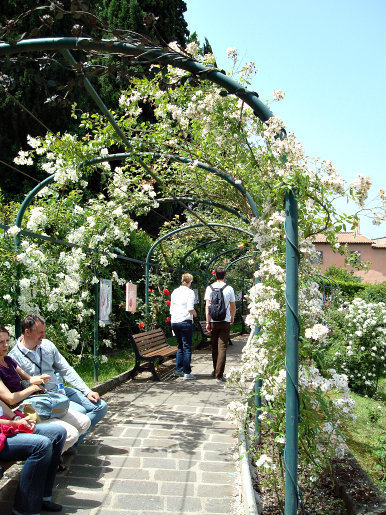
A few days ago, on 22 May, the French rose Eveparo won first prize in the hybrid tea category, here it is:

Beautiful! Other winners in different categories were German and Belgian.If you ever visit Rome, try to come in May and take a break here, it's well worth it...
The "Roseto Comunale", located along Circo Massimo (Circus Maximus), is open every day from 8:30 am to 7:30 pm. Entrance is free.
Related articles
 Weekend Inspiration - Rome's Roseto Comunale(arlenegibbsdecor.com)
Weekend Inspiration - Rome's Roseto Comunale(arlenegibbsdecor.com) Into the world's most romantic garden plus more(blogs.vancouversun.com)
Into the world's most romantic garden plus more(blogs.vancouversun.com)








Published on May 26, 2013 01:57
May 23, 2013
Free Book Fatigue or How Useful are Free Book Promotions?

Is the market saturated with free books? Are we all suffering from free eBook fatigue? Amazon has a very convenient free book promotion program included for the writers who join Kindle Direct Publishing Select: 5 free days allowed for every 3 months your book is on KDP Select. This is one of the major perks for placing your book on KDP Select, the drawback being that exclusivity is required: you cannot place your book for sale on any other e-platform. Is this worth it?
For many authors it is, as recently evidenced by an interesting survey covering the experience of enough authors (99) to make the conclusions worth looking at. It was reported in the eBook Author's Corner, do go over and take a look.
The overall conclusion is that "free eBooks promotions can be pure gold for authors." On the face of it, that looks real good until you realize the tense of the verb: "can be pure gold" but maybe it isn't. Indeed, many authors felt it wasn't: "free promotions may be FOOL'S GOLD".
Why? Many reasons were adduced:
1. "short-term attention, no longer term gains" : the effect in terms of increased sales not clear or proven;
2. "crowded market place": even free books don't gain you share in a market flooded with competition (there are over two million titles on the Kindle);
3. " saturated - free book fatigue": authors report success with free giveaways in 2011, not so anymore;
4. "ranking dropped": one author, Carol Davis Luce, known as the NightWriter for her series known as the "Night" mystery novels, says that her 99 cents book promotions work better than the giveaways. "The two times I had a Free promotion," she says, " my ranking dropped significantly, only to quickly rise higher than
before the promotion. I strongly feel that in the past year the market has been
glutted with free ebooks. Stop the insanity, please!"
Stop the insanity? Yes and no. As proved by my own recent experience with free book promotion (I had Part One of 2213:Forever Young go free from 10-14 May, now it's available for 99 cents), it's not so clear cut. On day 4, with the help of Book Gorilla, a special site that alerts its subscribers to free promotion in areas of interest to them, my book shot up in Amazon rankings to #1 for Science Fiction Adventure and #2 in Hard Science Fiction (which my book happens to be - Amazon surprised me in ranking it this way because I had neglected to use that keyword when uploading the book on KDP, yet they mysteriously got it right!)
However that success cannot be attributed solely to Book Gorilla, other websites contributed enormously: Venture Galleries several times (here and here),Magda Olchawska and Gladys Lawson on Day 3, Boomer Café on Day 4: my heartfelt thanks to everyone! And of course I used my own blog to launch the promotion (here). And on the last day I also got a boost in the UK market from ebookbargains.uk. One friend even wrote her circle of pals telling them how she'd heard a story (Part One) that she couldn't get out of her head with an ending that "not only shocked her but stuck with her...the kind of story that you just can't forget." Warm words for a writer!
Did this help my ranking in the days following the promotion? For a while, yes. But a week later, the effect had totally petered out and I was back to my "usual" ranking. Ditto for Part Two in the series (actually that's a misnomer: 2213:Forever Young is a serial novel, think of it as a collection of novelettes loosely connected between them by sharing the setting and main characters: this is a new fiction format that has emerged thanks to WOOL's success)
So does this mean it was a useless exercise? Not quite. There were actually two other side-effects that were beneficial:
1. I gained three customer reviews in one week, for me, that's something of a record. Any author is delighted to get written reviews, it's most gratifying, especially if you consider that writing a review is always an effort and really signals that a reader was moved enough by your work to do it;
2. On my book page, the book promotion populated the gallery of books listed under "customer who bought this item also bought" (it comes right after the book description) : 97 other books are listed (that's eleven pages!), this for me is something of a record and I'm very pleased; it shows people who got it were also people who got my other book in the series, Part Two of Forever Young and are interested in science fiction (a majority are sci-fi titles) so hopefully I have found my readers...There is further proof of this as another one of my recent books, A Hook in the Sky , a boomer novel that has nothing to do with science fiction, is also included in that list.
So this shows beyond doubt that even if there is no boost in sales there is increased exposure, you're reaching out to more readers. This can only make a writer happy and it is really all one can honestly hope for from a free book promotion.
But if you're thinking of doing one, be aware that it requires a lot of work and careful planning. I don't think I could have had this success without the support of my friends, both those I know in the real world and my virtual friends on the Net. Many thanks to everyone, I'm so grateful for the support! For a free promotion to work in this age of saturated book markets, you need a lot of friends and a strong Internet presence (through your blog, Facebook, Goodreads and wherever you are). Here's a good article to help you get started: click here for author James Moushon's advice, you're getting it from someone who's an expert and a highly successful user of free book promotions.









Published on May 23, 2013 03:12
May 22, 2013
What Dreams Tell You
Do our dreams tell us something about ourselves as Freud would have it? Do they tell us about the future? Can they act as a warning of impending doom? So many writers have used that device to push their story to another level of suspense...

Nightmare (painting by Claude)
This morning I woke up in a sweat, I'd had a nightmare: a friend of mine had asked me to look after her young child, a lovely, lively red-haired little boy, about four years-old, his brown eyes full of mischief. I had taken him to the village fair and somehow, the child had disappeared. I looked for him everywhere, searching every carousel, pastry shop, game stand and he was nowhere. I kept looking for his read head in the crowd, but there was no read-haired person to be seen.
What would I tell his mother? God, what should I do? Call the police in, obviously, the sensible thing to do. Make them look for the child and hope they'd find him soon. But that was no solution when it came to what I'd have to tell the mother. I was responsible and I had failed miserably...
I woke up feeling like a despicable piece of you-know-what. And yet the strange thing is, I have no idea who the mother was. I can't remember her face, if I ever saw it. This is so typical of dreams: a major character featuring in them has no face, no identity. At least, that's the way it is for me.
The other odd thing about this dream is that I remembered it, I normally never do. My dreams vanish in the crevices of my memory and usually, all I know is that I had a dream but have no idea what it was. One thing for sure: that dream expresses angst - as do the paintings you see here that I did a few years ago.

Night Phantasms (painting by Claude)
I sincerely hope that neither the paintings nor my dream of the lost child are warnings of impending events!
Do you dream too? What do you think your dreams express, desire, fear, a yearning, a sense of loss? Or do you believe dreams are or can be signs coming from another world, warnings of future events?
If you're a writer, do you use your dreams in your books? I never do, if one of my characters dreams, I have to invent it or use someone else's dream.
Or do dreams have absolutely no place in your busy life, and if so, how do you manage to keep them out of your unconscious?

Related articles
 ~What Does It Mean When You Dream About Snakes?~(mysticalmoonstar.wordpress.com)
~What Does It Mean When You Dream About Snakes?~(mysticalmoonstar.wordpress.com)
 Sigmund Freud and the writer's gift(jenalexanderbooks.wordpress.com)
Sigmund Freud and the writer's gift(jenalexanderbooks.wordpress.com)
 The Interpretation of Dreams - Freud on wish fulfilment(redvinylchair.com)
The Interpretation of Dreams - Freud on wish fulfilment(redvinylchair.com)
 Interpretation of seams? Sigmund Freud's couch needs £5,000 restoration(guardian.co.uk)
Interpretation of seams? Sigmund Freud's couch needs £5,000 restoration(guardian.co.uk)
 My Uncle Freud: A Famous Family (Part 2)(fairobserver.com)
My Uncle Freud: A Famous Family (Part 2)(fairobserver.com)










Nightmare (painting by Claude)
This morning I woke up in a sweat, I'd had a nightmare: a friend of mine had asked me to look after her young child, a lovely, lively red-haired little boy, about four years-old, his brown eyes full of mischief. I had taken him to the village fair and somehow, the child had disappeared. I looked for him everywhere, searching every carousel, pastry shop, game stand and he was nowhere. I kept looking for his read head in the crowd, but there was no read-haired person to be seen.
What would I tell his mother? God, what should I do? Call the police in, obviously, the sensible thing to do. Make them look for the child and hope they'd find him soon. But that was no solution when it came to what I'd have to tell the mother. I was responsible and I had failed miserably...
I woke up feeling like a despicable piece of you-know-what. And yet the strange thing is, I have no idea who the mother was. I can't remember her face, if I ever saw it. This is so typical of dreams: a major character featuring in them has no face, no identity. At least, that's the way it is for me.
The other odd thing about this dream is that I remembered it, I normally never do. My dreams vanish in the crevices of my memory and usually, all I know is that I had a dream but have no idea what it was. One thing for sure: that dream expresses angst - as do the paintings you see here that I did a few years ago.

Night Phantasms (painting by Claude)
I sincerely hope that neither the paintings nor my dream of the lost child are warnings of impending events!
Do you dream too? What do you think your dreams express, desire, fear, a yearning, a sense of loss? Or do you believe dreams are or can be signs coming from another world, warnings of future events?
If you're a writer, do you use your dreams in your books? I never do, if one of my characters dreams, I have to invent it or use someone else's dream.
Or do dreams have absolutely no place in your busy life, and if so, how do you manage to keep them out of your unconscious?

Related articles
 ~What Does It Mean When You Dream About Snakes?~(mysticalmoonstar.wordpress.com)
~What Does It Mean When You Dream About Snakes?~(mysticalmoonstar.wordpress.com) Sigmund Freud and the writer's gift(jenalexanderbooks.wordpress.com)
Sigmund Freud and the writer's gift(jenalexanderbooks.wordpress.com) The Interpretation of Dreams - Freud on wish fulfilment(redvinylchair.com)
The Interpretation of Dreams - Freud on wish fulfilment(redvinylchair.com) Interpretation of seams? Sigmund Freud's couch needs £5,000 restoration(guardian.co.uk)
Interpretation of seams? Sigmund Freud's couch needs £5,000 restoration(guardian.co.uk) My Uncle Freud: A Famous Family (Part 2)(fairobserver.com)
My Uncle Freud: A Famous Family (Part 2)(fairobserver.com)








Published on May 22, 2013 00:15
May 19, 2013
Looking to the Future: Will We Have a World War? A Revolution? Local Rebellions?
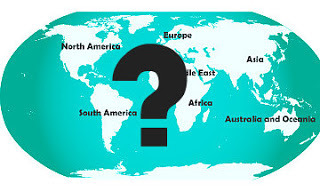
I look to the future everyday as I write new episodes of my serial novel 2213:Forever Young, soaking up scientific news and futuristic projections to try and "see" what it will look like. More wars, devastation, impoverishment, pollution and even a big-style revolution as so many predict?
Yes to war devastation, increasing poverty and pollution. No to revolution. Let me explain, taking the timeframe of my novel, i.e. what the world is likely to look like 200 years from now.
First, we can expect a level field world-wide in terms of economic growth and scientific progress. That is: most major countries in the world - from the US to China - will be at more or less the same level technically and economically. And in social terms, it will be the same too. Differences that we now perceive as coming from countries still attached to a Communist ideology will have disappeared. As I posited in Forever Young, the world will most certainly be divided between the Haves and Have-Nots, the One Percent and the 99 Percent.
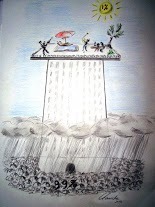
Why? Because this is an unusual strong trend that has recently gone global. Traditionally a great divide between the ultra rich and the rest of the population was a characteristic of the Third World where the poor lived and still lives in abject conditions. This divide used to be barely visible in the developed world but this has changed in the past 40 years. It has steadily grown to the point of looking irreversible. The Koch brothers and the Murdochs of this world increasingly control the big media and public opinion.
Moreover conservative forces emanating from the ultra rich are taking over governments everywhere and shaping policy. The present Great Recession which has purely financial roots confirms this and it is no surprise that the recession in Europe and the troubles of the Euro are due to a concerted attack against government debt sovereignty, supported by American rating agencies like Moody's etc. Meanwhile the Occupy Wall Street movement has petered out...It may revive, indeed I expect it to revive again and again, but the forces in place are so strong that it will never be able to take over. At least, it doesn't look likely over the next two hundred years...
In a world that is economically and scientifically a "level field", where political power is firmly in the hands of the One Percent, what other forces may one expect to rise? Cultural forces driven by language, arts and religion but certainly not leading to a revolution in the French sense of a 1789-like upheaval of the classes in society. The One Percent will see to it that this doesn't happen.
However, we should expect a series of small, localized cultural rebellions supported by a common language, traditions and religion. We already have many examples of this in the European Union which is economically a "level field" of the kind I describe here: we have the basques, the bretons, the Catalans, the Lombards, the Flemish etc. They all rise together and demand recognition from European society at large.
Will the EU or the nations hosting them (France, Italy, Spain, Belgium) give in to them? Not likely.
These are no more than bubbles in a boiling pot.
The question is how many "boiling pots" shall we be left with once the world is economically and scientifically level? I think we'll have just two big pots: an Eastern one dominated by China, Japan and India and a Western one pulling together North America and Europe, Russia and Turkey included. One may also expect the Western "pot" to draw in Latin America which shares its culture with several Southern European countries (mostly Spain and Portugal, but also Italy and Germany).
What we are likely to have then are two loose geo-political congregations of like-minded countries that will act and vote together as a group at the United Nations (which I don't expect to disappear), in short, the Eastern vs. the Western.
This still leaves a lot of countries on the border between the two or lost in far-flung uncertain positions that may be difficult to hold, like Australia, New Zealand and South Africa.
However, the biggest, unresolved borderline bunch of countries will be in the Middle East and Africa. And they are likely to be both the scene and the cause of numerous conflicts as the Eastern and Western congregations try to pull them in.

Protest in Kenya - painting by Claude
A classic bipolar world, very similar to what we've known during the Cold War, always on the brink of war but most probably able to resist it, as turbulence shakes Africa and other "hot points".
On the other hand, tensions are likely to be sharpened by the very nature of Islam, the major religion in those areas. The Moslems, unlike Christians, do not have church systems based on a hierarchical model and they are further divided among themselves between Shiites and Sunnites (not to mention Alawites etc): these are cultural forces that tear at the very fabric of their society. Additional reasons to expect wars to continue to erupt in the Middle East and Africa.
Finally, with Climate Change and the warming of the planet, the Arctic will emerge as a major bone of contention between the US and in future China. For the moment, the group of countries bordering the Arctic are discussing in the so-called Arctic Council how to share the resources of this new continent and China is not yet part of the discussion. But it has just been invited as an "observer nation" (the others that were invited are India, Japan, Singapore, South Korea and Italy on the European side - curiously leaving out France and Germany, no doubt a temporary oversight).
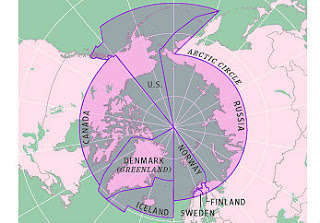
For the time being, the focus in the Arctic Council is on resource development and trade but it is obvious that this could degenerate into acrimonious accusations...Throw in the effect of scientific advances that will permit the future colonization of Mars and the probable mining of meteorites for precious metals, and you have the basis for war. Not revolution - a war for precious, increasingly scarce resources in a world that doesn't give up on economic growth, that cannot give up because of the economic interests of the One Percent.
In short, if you want to get a glimpse of the future, look closely at what will happen in the Arctic, it is our last frontier, at least on this planet! And if you're curious, you'll find more about our future world in my serial novel 2213:Forever Young, Part One and Two already published. Be warned: this is not serious stuff like this article, it's fiction and full of unexpected twists and turns...
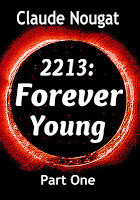
Ebook and paperback on Amazon
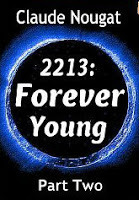
Ebook and paperback on Amazon
Your turn: What is YOUR vision of the future, 200 years from now?
Related articles:
 Time to Abolish Left vs. Right(readersupportednews.org)
Time to Abolish Left vs. Right(readersupportednews.org) Is revolution coming to the U.S.?(salon.com)
Is revolution coming to the U.S.?(salon.com) The Koch Brothers and the Right Wing's Media Conspiracy(readersupportednews.org)
The Koch Brothers and the Right Wing's Media Conspiracy(readersupportednews.org) Muslims to Tea Party: Welcome to our world(globalpublicsquare.blogs.cnn.com)
Muslims to Tea Party: Welcome to our world(globalpublicsquare.blogs.cnn.com) The Poorest Rich Country(veteranstoday.com)
The Poorest Rich Country(veteranstoday.com) Armed Revolution: Nearly One-Third Of Voters Say It Might Be Needed(freedomoutpost.com)
Armed Revolution: Nearly One-Third Of Voters Say It Might Be Needed(freedomoutpost.com) Brics And A Potentially Progressive Semiperiphery by Chris Chase-Dunn(zcommunications.org)
Brics And A Potentially Progressive Semiperiphery by Chris Chase-Dunn(zcommunications.org) Nigel Farage: Europe on the brink of 'wholesale, violent revolution'(talesfromthelou.wordpress.com)
Nigel Farage: Europe on the brink of 'wholesale, violent revolution'(talesfromthelou.wordpress.com) Save Europe: Split the Euro(bloomberg.com)
Save Europe: Split the Euro(bloomberg.com)








Published on May 19, 2013 21:15
May 16, 2013
My Secret Umbria Where Tourists Don't Go: A Castle with Wine and a Lakeside Trattoria
After my book promotion, I was exhausted and ready to get away from my computer. Ready to enjoy the Umbria that tourists rarely see, an ancient castle where you can buy superb local wine and a trattoria overlooking Lake Trasimeno, that serves exceptionally well-prepared food. If you ever come this way, be sure to visit these places, it's a little known side of the Dolce Vita in the green heart of Italy...
The castle is in Magione, here it is, a medieval fortress that belongs to the Order of Malta, rising darkly on its tree-covered hilltop:
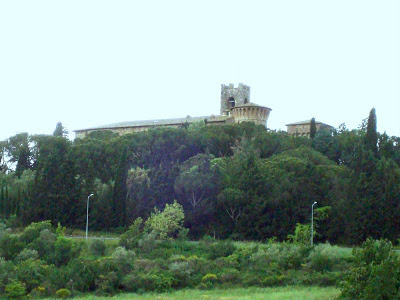
The Castle is just 15 miles north of Perugia, on the way to Florence. The gate is open, you can drive in to park your car:
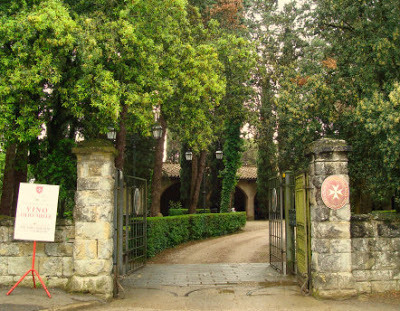
To the left, the sign tells you what they sell - wine, olive oil and honey - and the opening hours:
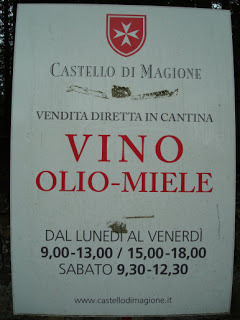
When you drive up to it, you're thrown 600 years back in time:
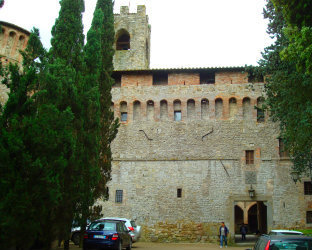
The inner courtyard is even more suggestive:
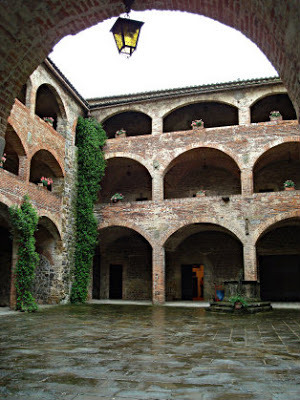
They sell the wine and oil in a cellar at the back of the courtyard:
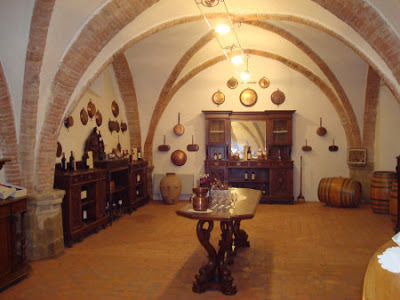
The Order of Malta actually owns a lot of wine-producing land around Lake Trasimeno and also up North in the Friuli region, around Rocca Bernarda. There's a broad range of wines on offer that you can try at the bar before you decide which one to buy - white and red and even bubbly, starting at very cheap prices (€4 for the local Grechetto and Monterone) and rising to €25 and more for the world-class Rocca Bernarda wines produced in the North.
But why not stick to Lake Trasimeno's wines? Local produce - wine and oil - has been reknown for a long time...at least since the 15th century, look at this sign I found on the cellar's wall:
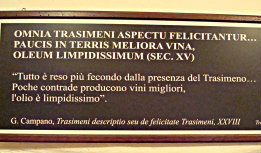
Roughly, it reads: "Everything is made more abundant thanks to the Trasimeno...Few places produce a better wine, and the oil is particularly pure."
Before you load up your car with your purchases, take a last look around you, the courtyard has a near perfect symmetry:
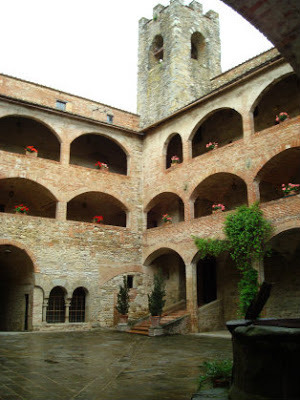
Then drive over to the near-by lake and go to Massimo's restaurant, nestled in the hillside between San Savino and San Feliciano, both old medieval villages on the lake. But in my opinion the best time for Massimo's is at sunset, and that's what we did. We drove out just as the sun was sinking, here it is, behind the Isola Polvese, the largest of the lake's three islands:
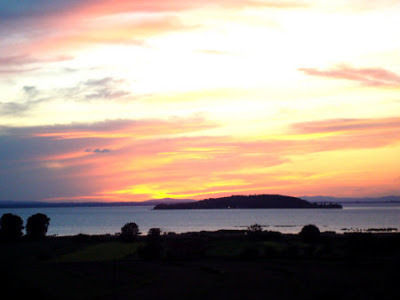
The restaurant has a pleasant covered terrace from which you get an unforgettable view of the lake and the Isola Polvese, as you can see here:
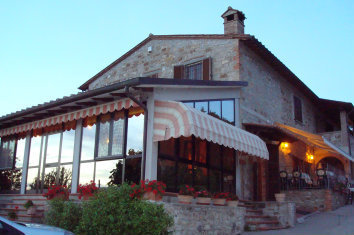
What to eat? Pasta of course, or risotto or pizza, all excellent. We decided on a simple pizza Margherita (just tomatoes and mozzarella with fresh basilico to flavor it) and followed it with an "Astice alla Catalana" - a delicious lobster covered with plenty of crunchy vegetables:
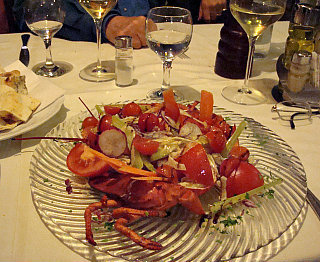
And white local wine, a dry Monterone, perfect for seafood. No dessert except a small lemon sorbet good for the digestion, we are boomers after all! No need to diet but it's best to keep on this side of rational eating...But for those who prefer meat or black truffles, there is that too - truffles are a specialty in Umbria and the meat is invariably superb because of the famous local beef variety from the near-by Chianciano valley.
When we left, I had a peek at the kitchen, super clean and modern:
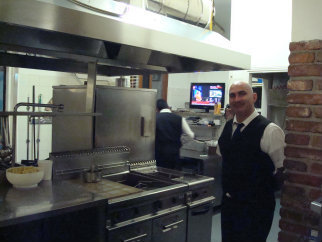 T
T
That smiling guy is Maurizio, he's Massimo's brother, he looks after the clients in the dining room while his brother oversees the kitchen. It's a strictly family business, no doubt the reason the food is consistently good and prices are contained.
That's the secret of the Italy that "works": family businesses!
The adresses and telephone numbers:
The Order of Malta Castle in Magione:
Viale Cavalieri di Malta, 31
tel: +39 075 5057319 email: segreteria@sagrivit.it
Da Massimo's on the road between San Savino and San Feliciano (but close to San Savino):
tel: +39 075 8476094 or 8476269 (better call to reserve)
Closed on Mondays
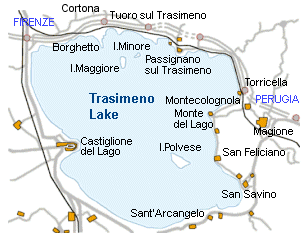
Related articles about Umbria's Hidden Gems:
 Excellent restaurant Perugia(villainumbria.wordpress.com)
Excellent restaurant Perugia(villainumbria.wordpress.com)
 Sailing(magicspello.wordpress.com)
Sailing(magicspello.wordpress.com)
 Umbria is Beautiful(nuovastoria.wordpress.com)
Umbria is Beautiful(nuovastoria.wordpress.com)
 The Delicious Umbria Food and Wine Competition(andrerib.com)
The Delicious Umbria Food and Wine Competition(andrerib.com)
 Lago - Tuoro sul Trasimeno, Italy(travelpod.com)
Lago - Tuoro sul Trasimeno, Italy(travelpod.com)









The castle is in Magione, here it is, a medieval fortress that belongs to the Order of Malta, rising darkly on its tree-covered hilltop:

The Castle is just 15 miles north of Perugia, on the way to Florence. The gate is open, you can drive in to park your car:

To the left, the sign tells you what they sell - wine, olive oil and honey - and the opening hours:

When you drive up to it, you're thrown 600 years back in time:

The inner courtyard is even more suggestive:

They sell the wine and oil in a cellar at the back of the courtyard:

The Order of Malta actually owns a lot of wine-producing land around Lake Trasimeno and also up North in the Friuli region, around Rocca Bernarda. There's a broad range of wines on offer that you can try at the bar before you decide which one to buy - white and red and even bubbly, starting at very cheap prices (€4 for the local Grechetto and Monterone) and rising to €25 and more for the world-class Rocca Bernarda wines produced in the North.
But why not stick to Lake Trasimeno's wines? Local produce - wine and oil - has been reknown for a long time...at least since the 15th century, look at this sign I found on the cellar's wall:

Roughly, it reads: "Everything is made more abundant thanks to the Trasimeno...Few places produce a better wine, and the oil is particularly pure."
Before you load up your car with your purchases, take a last look around you, the courtyard has a near perfect symmetry:

Then drive over to the near-by lake and go to Massimo's restaurant, nestled in the hillside between San Savino and San Feliciano, both old medieval villages on the lake. But in my opinion the best time for Massimo's is at sunset, and that's what we did. We drove out just as the sun was sinking, here it is, behind the Isola Polvese, the largest of the lake's three islands:

The restaurant has a pleasant covered terrace from which you get an unforgettable view of the lake and the Isola Polvese, as you can see here:

What to eat? Pasta of course, or risotto or pizza, all excellent. We decided on a simple pizza Margherita (just tomatoes and mozzarella with fresh basilico to flavor it) and followed it with an "Astice alla Catalana" - a delicious lobster covered with plenty of crunchy vegetables:

And white local wine, a dry Monterone, perfect for seafood. No dessert except a small lemon sorbet good for the digestion, we are boomers after all! No need to diet but it's best to keep on this side of rational eating...But for those who prefer meat or black truffles, there is that too - truffles are a specialty in Umbria and the meat is invariably superb because of the famous local beef variety from the near-by Chianciano valley.
When we left, I had a peek at the kitchen, super clean and modern:
 T
TThat smiling guy is Maurizio, he's Massimo's brother, he looks after the clients in the dining room while his brother oversees the kitchen. It's a strictly family business, no doubt the reason the food is consistently good and prices are contained.
That's the secret of the Italy that "works": family businesses!
The adresses and telephone numbers:
The Order of Malta Castle in Magione:
Viale Cavalieri di Malta, 31
tel: +39 075 5057319 email: segreteria@sagrivit.it
Da Massimo's on the road between San Savino and San Feliciano (but close to San Savino):
tel: +39 075 8476094 or 8476269 (better call to reserve)
Closed on Mondays

Related articles about Umbria's Hidden Gems:
 Excellent restaurant Perugia(villainumbria.wordpress.com)
Excellent restaurant Perugia(villainumbria.wordpress.com) Sailing(magicspello.wordpress.com)
Sailing(magicspello.wordpress.com) Umbria is Beautiful(nuovastoria.wordpress.com)
Umbria is Beautiful(nuovastoria.wordpress.com) The Delicious Umbria Food and Wine Competition(andrerib.com)
The Delicious Umbria Food and Wine Competition(andrerib.com) Lago - Tuoro sul Trasimeno, Italy(travelpod.com)
Lago - Tuoro sul Trasimeno, Italy(travelpod.com)








Published on May 16, 2013 08:47
May 12, 2013
Feeling Stressed? Take a Walk Outside in the Sunshine!
If you are stressed by work or wearied down by something you're deeply involved in (in my case, my book promotion), there's no better place to be than Italy, but surely anywhere in the springtime, with beautiful flowers blooming, will prove a relief.
A walk in the garden was certainly a Godsent for me. Look at the lovely flowers blooming here, in Umbria, the green heart of Italy, like this brand new geranium peeking out of its pot:
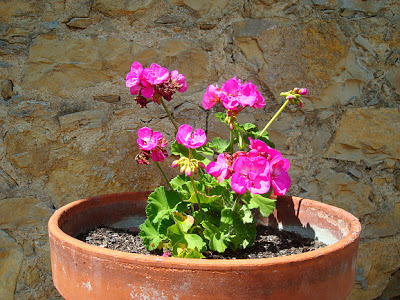
Set against the mellowed tone of the house's old stone wall, it is glorious. Or these springtime iris:
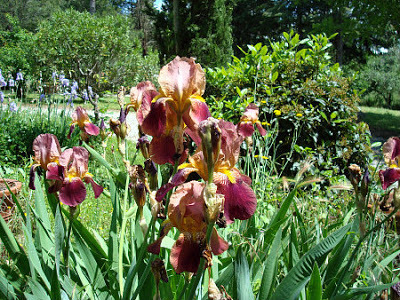
Then we drove to Lake Trasimeno, I wanted to take a walk on the Isola Polvese, an island that is a natural reserve:
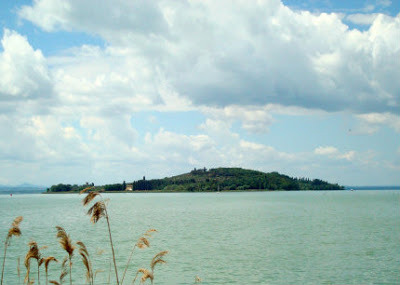
But we missed the ferryboat, it wouldn't take us there for another two hours. So I consoled myself watching the ducks:
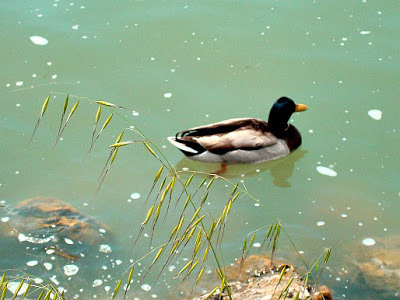
A lovely day all in all, and so nice to get away from following on my computer screen what's happening to my book promotion! In case you haven't heard, Part One of my Sci-Fi serial novel 2213:Forever Young is free until May 14 (you're still in time!) Amazon rankings that refresh every hour show what is happening to it. My computer doesn't allow me to take screen shots (or I don't know how to do it with the old machine I've got here), so I took a picture of it with my camera to show you what I saw:
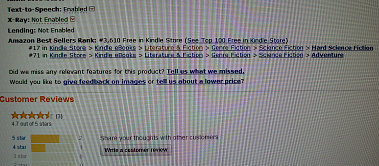
Sorry for the bad quality! But if you squint hard, you'll see something on the right of the screen that I found amazing: the book is ranked #17 in Science Fiction> Hard Science Fiction . Not bad!
Now I didn't even know that Amazon had such a category as "Hard Sci-Fi" (though Wikipedia does) and it is all the more surprising as I never gave them those keywords when I uploaded the book on Kindle Direct Publishing. I did suggest "adventure" and "suspense", and I see it ranks #71 in Science Fiction >Adventure.
But it's the "Hard Sci-Fi" category that made me happy: it is quite accurate because 2213:Forever Young is indeed a tough, emotion-laden story based on a highly probable projection into the future of current trends in science and society. Things like genetic manipulation that could solve the problem of aging or the exponential growth in income inequality in the past 40 years that will, if it goes on, inevitably lead to the Great Divide between the One Percent that has everything and the rest of us.
So that's the world of 2213:Forever Young: a "hard sci-fi" world where all the benefits of technical progress go to the One Percent...while the planet sinks in pollution. Once upon a time, it was green (or blue as seen from Outer Space), expect it two hundred years from now to turn black! Yes, hard sci-fi it is, in more ways than one...
Now that picture on my computer screen was taken some hours ago, so that when you go to Amazon it may look different, the ranking keeps changing depending on the number of downloads! Like all authors that have a free promotion going, I am on needles and have to resist the temptation to "check my numbers"...Now you understand why I took a walk!
INFO ABOUT THE DOUBLE PROMOTION to celebrate the
publication of Part Two of 2213:Forever Young:
Until 14 May Part One is FREE and Part Two
costs only 99 cents.
Click here
for your free copy of Part One.
Click here for your 99 cents copy of Part Two.
Hurry, the promotion lasts ANOTHER TWO DAYS
till Tuesday included (afterwards, the price returns to its normal level of $1.99)
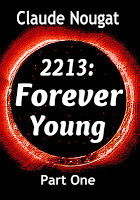
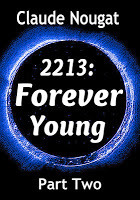









A walk in the garden was certainly a Godsent for me. Look at the lovely flowers blooming here, in Umbria, the green heart of Italy, like this brand new geranium peeking out of its pot:

Set against the mellowed tone of the house's old stone wall, it is glorious. Or these springtime iris:

Then we drove to Lake Trasimeno, I wanted to take a walk on the Isola Polvese, an island that is a natural reserve:

But we missed the ferryboat, it wouldn't take us there for another two hours. So I consoled myself watching the ducks:

A lovely day all in all, and so nice to get away from following on my computer screen what's happening to my book promotion! In case you haven't heard, Part One of my Sci-Fi serial novel 2213:Forever Young is free until May 14 (you're still in time!) Amazon rankings that refresh every hour show what is happening to it. My computer doesn't allow me to take screen shots (or I don't know how to do it with the old machine I've got here), so I took a picture of it with my camera to show you what I saw:

Sorry for the bad quality! But if you squint hard, you'll see something on the right of the screen that I found amazing: the book is ranked #17 in Science Fiction> Hard Science Fiction . Not bad!
Now I didn't even know that Amazon had such a category as "Hard Sci-Fi" (though Wikipedia does) and it is all the more surprising as I never gave them those keywords when I uploaded the book on Kindle Direct Publishing. I did suggest "adventure" and "suspense", and I see it ranks #71 in Science Fiction >Adventure.
But it's the "Hard Sci-Fi" category that made me happy: it is quite accurate because 2213:Forever Young is indeed a tough, emotion-laden story based on a highly probable projection into the future of current trends in science and society. Things like genetic manipulation that could solve the problem of aging or the exponential growth in income inequality in the past 40 years that will, if it goes on, inevitably lead to the Great Divide between the One Percent that has everything and the rest of us.
So that's the world of 2213:Forever Young: a "hard sci-fi" world where all the benefits of technical progress go to the One Percent...while the planet sinks in pollution. Once upon a time, it was green (or blue as seen from Outer Space), expect it two hundred years from now to turn black! Yes, hard sci-fi it is, in more ways than one...
Now that picture on my computer screen was taken some hours ago, so that when you go to Amazon it may look different, the ranking keeps changing depending on the number of downloads! Like all authors that have a free promotion going, I am on needles and have to resist the temptation to "check my numbers"...Now you understand why I took a walk!
INFO ABOUT THE DOUBLE PROMOTION to celebrate the
publication of Part Two of 2213:Forever Young:
Until 14 May Part One is FREE and Part Two
costs only 99 cents.
Click here
for your free copy of Part One.
Click here for your 99 cents copy of Part Two.
Hurry, the promotion lasts ANOTHER TWO DAYS
till Tuesday included (afterwards, the price returns to its normal level of $1.99)











Published on May 12, 2013 11:13



